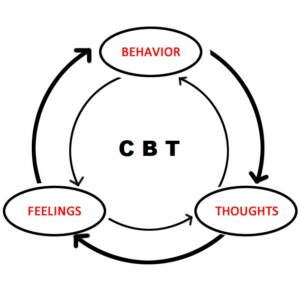Obsessive-compulsive disorder (OCD) is a mental health condition that is characterized by intrusive thoughts and rituals. This can cause stress and anxiety, leading to impaired functioning in daily life. For many people with OCD, one of the main symptoms is breathing obsessively. While this can be distressing and disruptive, there are treatments available to help you manage your symptoms. In this blog post, we’re going to explore all the treatment methods for breathing OCD, including cognitive-behavioral therapy (CBT), medication, relaxation techniques, and more. Read on to learn more about how you can take control of your OCD symptoms and start living a better life today.
Contents
Intro to Breathing OCD

Breathing OCD is an anxiety disorder characterized by obsessive thoughts and behaviors related to breathing. People with this condition may be obsessed with the idea that they are not breathing correctly, or that something is wrong with their lungs. They may also have compulsions to perform certain rituals or movements to relieve their anxiety.
There are many different types of breathing OCD, and each one requires a different treatment approach. The most common type of breathing OCD is hyperventilation, which is characterized by rapid and shallow breathing. This type of OCD can be treated with a combination of medication and therapy. Other types of breathing OCD include apnea, which is characterized by periods of not breathing; bradypnea, which is characterized by slow and shallow breathing; and tachypnea, which is characterized by rapid and deep breathing. Each of these types of OCD requires a different treatment approach, so it is important to work with a qualified mental health professional to develop a plan that is tailored to your specific needs.
Breathing OCD Treatment Methods
Treating breathing OCD typically involves a combination of different methods, including cognitive-behavioral therapy (CBT), medication, relaxation techniques, and lifestyle changes.
Cognitive Behavioral Therapy

Cognitive behavioral therapy (CBT) is a form of psychotherapy that emphasizes the role of thoughts in affecting emotions and behaviors. CBT is commonly used to treat anxiety and depression, but it can also be used to treat other mental health conditions.
CBT works by helping people to identify and challenge negative thoughts and beliefs, and to replace them with more positive ones. This can help to reduce feelings of anxiety and low mood, and can also change behaviors.
CBT is usually delivered in a structured way, with set goals and homework tasks between sessions. It typically lasts for around 12 weeks, although this can vary depending on the individual.
Exposure and Response Prevention
Exposure and response prevention (ERP) is a type of cognitive behavioral therapy that focuses on helping people with OCD manage their anxiety by reducing their avoidance behaviors and learning to tolerate the anxiety-provoking thoughts, feelings, and situations they typically avoid.
ERP treatment usually involves gradually exposing the person to the things they fear and avoid, while helping them to resist the urge to engage in compulsions or avoidance behaviors. The goal is to help the person learn that they can tolerate the anxiety-provoking situation without needing to engage in their compulsions or avoidance behaviors.
ERP is considered an effective treatment for OCD, with research showing that it can help up to 70% of people with OCD reduce their symptoms.
Medications
There are many different types of medications that can be used to treat Breathing OCD. The most common type of medication is antidepressants. These can be very effective in treating the symptoms of Breathing OCD. Other types of medications that may be used include anti-anxiety medications, antipsychotic medications, and mood stabilizers.
Some of the medications that may be used to treat Breathing OCD include:
• Selective serotonin reuptake inhibitors (SSRIs)
• Tricyclic antidepressants (TCAs)
• Monoamine oxidase inhibitors (MAOIs)
• Benzodiazepines
• Atypical antipsychotics
• Mood stabilizers
It is important to talk to your doctor about the benefits and risks associated with any type of medication that you may be considering.
Support Groups
Many national and international organizations provide support groups for people with OCD. These groups offer a safe and supportive environment where members can share their experiences and advice with others who understand what they are going through.
The support groups can also provide helpful resources and tools to help manage the symptoms of OCD.
Lifestyle Changes

Many different lifestyle changes can help to treat and manage OCD. Some of these changes may be small, while others may require a more significant lifestyle change. However, all of these changes can help to improve symptoms and quality of life for those with OCD.
- One important lifestyle change is to practice stress management techniques. This can include things like yoga, meditation, or deep breathing exercises. Reducing stress can help to reduce the frequency and severity of OCD symptoms.
- Another lifestyle change that can be helpful is to make sure to get enough sleep each night. Sleep deprivation can worsen OCD symptoms, so it is important to get at least 7-8 hours of sleep each night.
- The diet also plays a role in treating OCD. Eating a balanced diet with plenty of fruits, vegetables, and whole grains can help to improve symptoms. Avoiding triggers such as caffeine or sugar can also help manage OCD.
Benefits of Getting Breathing OCD Treatment
Many different methods can be used to treat Breathing OCD, and the most effective approach will vary from person to person. However, there are a few common treatment methods that are often used to help people with this condition.
Treating breathing OCD can be beneficial for both the physical and mental health of the person affected.
Some of the most common benefits for treating breathing OCD include:
• Improved breathing quality which can help reduce anxiety and stress levels.
• Reduced fear and anxiety associated with breathing.
• Increased self-confidence and improved overall life satisfaction.
When To Seek Treatment For Breathing OCD?
If you think you may have Breathing OCD, it is important to seek treatment from a mental health professional. Many people with OCD are reluctant to seek treatment because they are afraid of being seen as crazy or weak. However, seeking treatment is the best way to manage your OCD and get control of your life back.
Some of the reasons why you should be seeking treatment for Breathing OCD include:
- Symptoms of Breathing OCD are interfering with your daily life
- When you experience anxiety or fear related to breathing
- When you are having trouble controlling the urge to perform rituals and compulsions
- When you feel that your thoughts of death or mortality are consuming your life
- If you find yourself avoiding activities due to fears of not being able to breathe properly
- When your symptoms lead to depression, isolation, or suicidal thoughts
- When family and friends are concerned about your breathing patterns
Conclusion
Breathing OCD is a unique form of Obsessive Compulsive Disorder that can have a significant impact on your day-to-day life. Fortunately, there are several treatments available that may help you manage the symptoms and live an enjoyable life. Cognitive Behavioral Therapy is generally considered to be one of the most effective treatment methods for breathing OCD, however, other options such as Exposure Response Prevention Therapy and Relaxation Techniques can also help manage this disorder. Ultimately, it’s important to speak with your doctor or mental health professional so they can properly diagnose the issue and create a personalized plan that works best for you.
For more information and guidance, please contact OCDMantra. OCD is a mental health disorder characterized by obsessions and compulsions. If you have any queries regarding OCD treatment, ERP therapy experienced therapists at OCDMantra can help: Book a trial OD therapy session.


